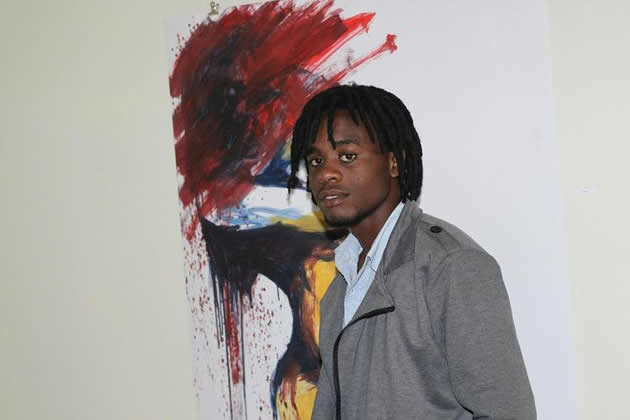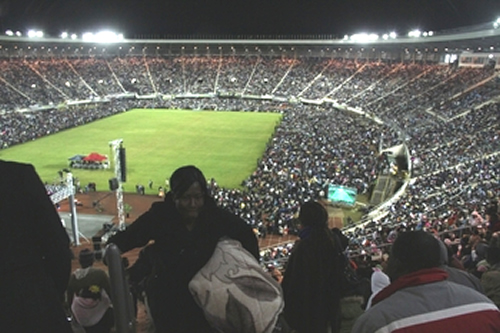Politics, corporate conspiracy and intellectual prostitution

 Stanely Mushava Literature Today
Stanely Mushava Literature Today
The occasion is a mid-century writers’ retreat.
Out in remote detachment from the corporate scheme of life, the writers empty their hearts one to another about the dirty laundry which comes with their trade.
“Strike for Life” author John Swinton steps up to the podium and laments, Jeremiah-style, the degeneration of the writer from a champion of the poor to a pawn on the chessboard of power-brokers.
He foregrounds the criminal functions on the writer’s taskbar including the retail of stereotype, falsehood, perversion, omission, vilification and manipulation. Swinton’s final portrait of the writer features a spineless traitor who prostrates at the feet of capital and sells his people to earn his bread.
“We are the tools and vassals of rich men behind the scenes. We are the jumping-jacks; they pull the strings and we dance. Our talents, our possibilities and our lives are all the property of other men. We are intellectual prostitutes,” he articulates.
The corporate conspiracy against the truth, which riles Swinton so, is not particular to America. It is a menace of universal proportions. The haggy, elderly Russian dissident Leo Tolstoy, elsewhere, attacks his contemporaries for transmuting art from the unmediated language of emotion into a commercial enterprise.
Tolstoy declaims in “What is Art?” the trending current of art as a prostitute, enticing and adorned for market, never the less constituting an agency of death.
In “Questions for a Pandering Poet,” one of Africa’s literary thoroughbreds, Nigerian poet Niyi Osundare, levels the question against his circle: “What is the poet doing in the corridors of power?”
Osundare concludes that the artist’s compromise emanates from ambient pressure to choose between duty and diadem and between humanity and mammon. The danger of settling for the wrong choice between conscience and convenience, sensitivity and sensuality, and fairness and fanfare perpetually stalks writers across categories.
When a writer misses the mark, he writes with money in the left hemisphere of his mind and political rewards in the right hemisphere of his mind.
Needless to say there is (to use Hogarth’s broadside) nothing is right in the left side and nothing is left in the right side of such a mind.
Noam Chomsky points out in “Powers and Prospects” that for the writer to be a moral agent instead of a monster he must bring the truth about matters of human significance to an audience that can do something about them.
As it is, more writers are becoming secretaries rather than authors, in actual sense, because significant volumes of what they write are bankrolled by individuals and institutions other than them, without logging off the operating system of political economy.
The writer, therefore, uses his store of devices to rubber-stamp a predetermined memo not to generate relevant new angles for a discourse. As the Mosaic analogy holds, Balaam has the profession while Balak has the bank order and the message. The debate about whether writers must dabble in politics is almost as old as literature.
On one hand, writers are warned to back off politics, that sacred turf where angels fear to trade. On the other hand, it is presumed that politics will compromise the sublimity of literature.
The polar extremes are equally wrong.
A disarming mantra called “art for art’s sake” has also been enlisted to forestall the convergence of politics and literature. Quite clearly, all such models are an unaffordable luxury.
They may command expansive stacks in the library but they have no utility in a real world everywhere dappled with prospects and problems, interests and inequities,
values and vices, affluence and famishment in equal measure.
The models erroneously presume the workstation of the artist to be a vacuum where everything is imaginatively contrived instead of a dynamic human society in need of critical functionaries to argue the case for conscience.
The characterisation of man as a political animal holds true especially when man’s bestiality to man is considered.
A process of artificial selection is constantly working out whereby political instruments are used to aggrandise one class and diminish another.
The writer must not sell his civic mandate to power and capital, but should consecrate his eloquence to the aid of the poor and his genius to the cause of the disenfranchised.
Unless he honours this mandate, he spins an idle wheel in the service of the instruments of cruelty, whether actively or passively.
Passivity is complicity.
Cicero locates two kinds of injustice: the first in those who impose injury, and the second in those who fail to protect others from the injury when they can.
The writer who disinvests interest from politics dismantles the defences of the poor.
“Being passive is the greatest suffering one can endure. It results in oppression and alienation. Being passive is actively choosing not to be free. And it actively means ruling out the option of hope for the future,” argues George Kahari in “The Rise of the Shona Novel”.
Osundare is unequivocal: “African poets have no choice but to be political in their work. You cannot keep quiet about the situation in the kind of countries we find ourselves in.”
In “Not My Business,” Osundare faults people who passively watch injustice as long as it does not affect them, warning that the unbroken cycle will eventually catch up with them.
The persona watches indifferently as his compatriots are subjected to injustice, shrugging off their plight as long as the perpetrators do not take the yam out of his mouth. Of course, they finally get done with others and come for his yam!
In her afterword to “Half of a Yellow Sun,” Chimamanda Ngozie Adichie allows for varied literary pursuits, some not necessarily political, but retains a place for herself on the combative front.
“In a place of scarce resources made scarcer by artificial means, life is always political. In writing about that life, you assume a political role,” Adichie says.
The writer’s occupation with politics may not be not mandatory but it is almost inevitable. The most potent cluster in this regard can be located in colonial and early post-colonial literature.
The three musketeers – Wole Soyinka, Ngugi WaThiongo and the late Chinua Achebe – represent an age which is probably yet to be matched in the art of the burning polemic.
Africa needs more literature with the uninhibited potency of “Kongi’s Harvest,” “Devil on the Cross” and “Anthills of the Savannah”.
More up-to-the-minute poems like “Apologia (Nkomati)” are needed to jolt politicians out of complacency and prove to them that their hands are less black than they should be.
There is no legitimate place for literature which borders on vague ideals, feeds into meaningless intertextuality, recycles desensitising stereotypesor pontificates from top-down lexicons without zeroing in on life and death challenges.
Writers worth the vocation have no business cozying up with institutions and personalities. Their political mandate is above the trivial claims of partisanship.
After all, the final wager of battle is not party against party or politician against politician but the poor and the powerless against the super-rich and the all-powerful. This is where the more urgent drama, prose and poetry is.
Let a fresh stream of literature now surge forth which holds economic saboteurs and political vandals to account for the love of Africa and her multitudes at the base of the class pyramid.










Comments